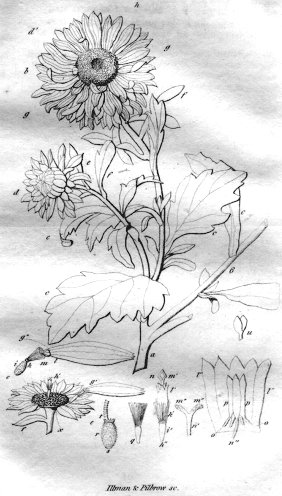Vegetable Physiology
Today, a young student forms a scientific theory. The University of Houston's College of Engineering presents this series about the machines that make our civilization run, and the people whose ingenuity created them.
I found a remarkable sentence in Jane Marcet's early- nineteenth-century textbook, Conversations on Vegetable Physiology. In it, a fictional tutor, Mrs. B., talks with two pupils, Emily and Caroline. The conversation has turned to the question of how plants take nourishment from sap. Mrs. B. says, "Many ingenious hypotheses have been proposed but none have proved satisfactory." Then she adds,
That which appears least objectionable, is the agency of Electricity; but it must be owned that the chief argument in favour of [it] is that we are not yet sufficiently acquainted with its powers to [disprove] the hypothesis.
That says a lot about how scientific thinking goes wrong. Marcet warns her young pupils how tempting and dangerous it is to accept an explanation simply because it's mysterious. Theories alone will no more explain anything than bare data will. We need both. I think about the science-fiction writer who creates time travel by sending a space ship through a worm hole. Worm holes are mysterious enough to accommodate anything, so why not time travel?
Electricity was a cutting-edge scientific mystery back in 1829. The science of Marcet's age had become a science of data and observation. A whole set of new theoretical sciences was about to replace all that. Soon thermodynamics, field theory, molecular theory, and germ theory would be the new concept-driven sciences.
While most scientists around Marcet still reached for laundry lists of data, her books breathed forth a keen sense of those emerging theoretical, idea-based, sciences. She has Emily and Caroline trading, not just facts, but ideas about science.
When Mrs. B. explains that hot air over the Sahara has a high capacity for absorbing moisture, Emily says, "Oh, that must be why North winds seldom bring rain. They hold more of their moisture as they move from the North into warmer lands to the South." It's hard to teach students to make theoretical deductions like that. It's far easier to let science look like laundry lists of canned information.
So Marcet's books, written in England, became a staple of American science education. Our early educators wrestled with them. They had the sense to use her books, but they fought with the content. The exercise questions they added looked for words and phrases, not for deductions. The footnotes they added criticized her use of theory. Yet they chose her books instead of the many available texts that simply recited facts.
Marcet nurtured students' minds by emphasizing theory and experiments over applications. No wonder she issued that warning about sweeping unexplained nature under the rug of mysterious electricity. When you're teaching concepts, and not just outcomes, you'd better point out the traps. Teaching students to trust their own ability to think is a dangerous business if we don't teach them to think clearly.
I'm John Lienhard, at the University of Houston, where we're interested in the way inventive minds work.
(Theme music)
Marcet, J. H., Conversations on Vegetable Physiology; Comprehending the Elements of Botany, with their Application to Agriculture. New York: Printed by Sleight & Robinson, 1830.
Lindee, M. S., The American Career of Jane Marcet's Conversations on Chemistry, 1806-1853. Isis, March, 1991, pp. 9-23.
Moon, H. C., The Career of Jane Marcet: A Reflection of Forces that Shaped Women's place in 19th century Science. A Thesis Presented to the Faculty of the Honors College and the Department of History, University of Houston, August 1995.
For more on Marcet see Episodes 741, 744, 745, 828, 950 and 1302.

illustration from Marcet's Vegetable Physiology